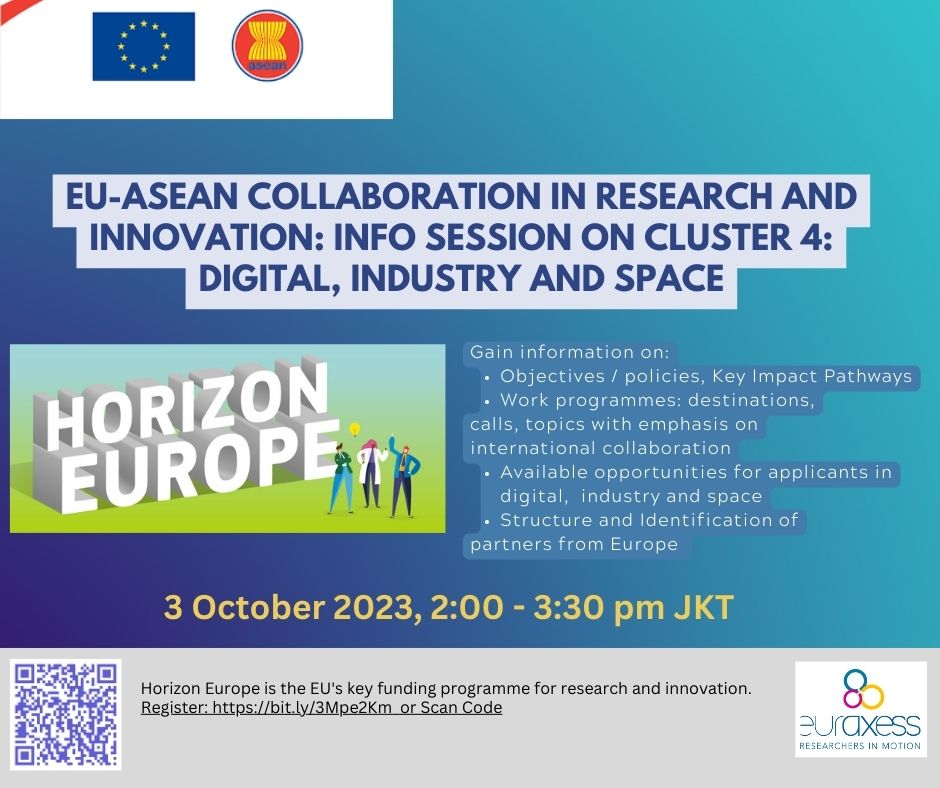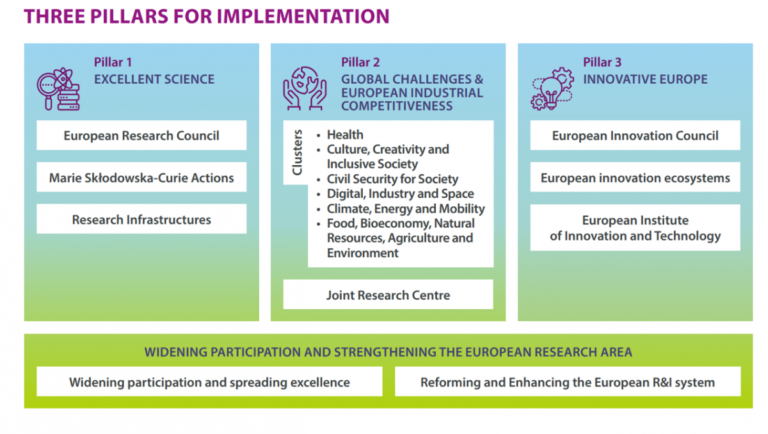
Promoting ASEAN participation in Horizon Europe: series of information & training sessions
EURAXESS ASEAN with the support of the European Commission, Directorate-General for Research and Innovation (DG RTD), and the Science and Technology Division of the ASEAN Secretariat is conducting a series of information, training and – where feasible – matchmaking events to facilitate participation in Horizon Europe research consortia.
This event series will run in a virtual format between May and September 2023 and will culminate in a physical meeting to be held in the margins/back-to-back, of the ASEAN COSTI meeting (Partnership Dialogue) which will provide the opportunity for all ASEAN COSTI members to participate onsite.
The event is open to research actors from across ASEAN who are interested in exploring opportunities for collaborative research with Europe in the framework of Horizon Europe.
Concrete Opportunities for collaborative research with European partners in four thematic focus areas
The event series was launched on 16 May with a general information session detailing the modalities for Third Country research actors to join Horizon Europe-funded research consortia.
‘Biomedicine & Health’, Tuesday, 13 June 2023 3:00-5:00 pm JKT Time (GI/IT+7)
'Food Science', Tuesday, 11 July 2023 3:00-5:00 pm JKT Time (GI/IT+7)
'Sustainable Energy Research', Tuesday, 15 August 2023 3:00-5:00 pm JKT Time (GI/IT+7)
'Space Technology', Tuesday, 3 October 2023 2:00-4:00 pm JKT Time (GI/IT+7) REGISTER HERE

Background
Under the Plan of Action to Implement the ASEAN-EU Strategic Partnership (2023-2027), the EU and ASEAN have committed to enhance cooperation in research and innovation, science and technology particularly via the ASEAN-EUROPEAN Dialogue on Science and Technology. A strategic vehicle for EU-ASEAN cooperation in STI is through Horizon Europe - the European Union's flagship research and innovation funding programme with a budget of over €95 billion for the period 2021-2027. Horizon Europe has three main pillars, namely, Excellent Science, Global Challenges and European Industrial Competitiveness, and Innovative Europe. Horizon Europe Pillar 2 is of particular relevance to ASEAN research actors as it focuses on addressing global challenges such as health, climate change, and digital transformation, which are also important for the ASEAN region.
Horizon Europe
Horizon Europe is the current Research and Innovation (R&I) Framework Programme of the European Union with a budget of €95.5 billion. It will run from 2021 to 2027.
The main work programme of Horizon Europe for the period 2021-2022 outlines the objectives and specific topic areas that will receive a total of €14.7 billion in funding.
How is the programme structured?
Horizon Europe is structured along three pillars. Pillar 1 - Excellent Science, Pillar 2 - Global Challenges, Pillar 3 - Innovative Europe.

The vast majority of Horizon Europe funding is allocated to Pillar 2 on the basis of competitive calls open to applications from researchers, businesses and other organisations located in any of the EU Member States or Associated Countries to Horizon Europe as well as partners from all over the world.
None of the ASEAN member countries are currently associated to Horizon Europe. ASEAN countries are considered Third Countries (i.e., not EU countries and not Associated countries).
Who can participate?
The Horizon Europe programme is open to the world.
Institutions from third countries (including ASEAN countries) can join most of Horizon Europe calls under Pillar 2 as part of a research consortium comprised of:
- at least 1 partner from an EU member state and
- at least 2 additional partners from 2 other different countries coming either from EU member states and/or countries associated to Horizon Europe.
In case you need to look for partners to submit a proposal, you may check this guide from our colleagues at EURAXESS LAC on how to find partners in Horizon Europe.
Who is eligible for funding for Pillar 2 calls?
ASEAN institutions are fully eligible for funding from the European Commission, except institutions from Singapore and Brunei.
In the case of institutions (public or private) from countries not automatically eligible to funding, funding can exceptionally be provided if:
- The country is explicitly identified in the work programme and/or call for proposals as being eligible for funding.
- if the granting authority considers that their participation as a beneficiary is essential for implementing the project, for example in view of their:
- outstanding competence/expertise,
- access to particular research infrastructures,
- access to particular geographical environments,
- access to particular data.
In all the other cases, the non-automatically funded institutions have to participate at their own cost.
You can find all calls on the Funding & Tenders Portal.
See also:
Common mistakes to avoid when applying for Horizon Europe funding
How to find examples of successful research projects with EU funding (CORDIS)
National Contact Points for Horizon Europe
The network of National Contact Points (NCPs) is the main structure to provide guidance, practical information and assistance on all aspects of participation in Horizon Europe. NCPs are also established in many non-EU and non-associated countries ("third countries").
